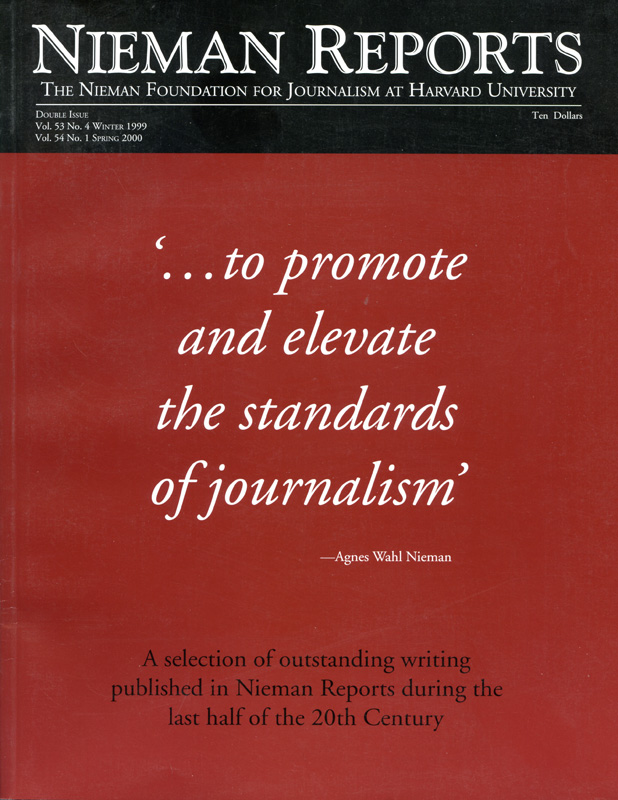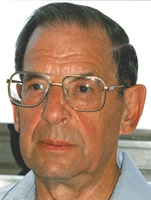[This article originally appeared in the Summer 1998 issue of Nieman Reports.] [T]here is far too little public understanding in the United States about the role of the press in the American system. And one good reason for that is that the press itself is much too secretive about what it does.
One of the prerequisites for greater understanding of watchdog journalism is to demystify the press. Help the public to understand what the press is supposed to doand why the sweeping writ of "freedom of the press" is in the First Amendment.
Fear of the abuse of power was the galvanizing force in the American Revolution and continues to be the strongest justification for a challenging and thoroughly independent press.
The press, in turn, is obliged to perform honestly, fairly and with civility at all times.
Journalism is an odd mixture of chutzpah and humility. Some of our colleagues tend to mix the two like they mix martinissay, five parts chutzpah to one part humility, as in gin and vermouth. Others stretch that to a 10 to 1 mixture, while our extremists seem to use all gin, with not even a whiff of humility.
In our business, none of us can impose rules on anyone else, especially for behavior. You might say that is one freedom of the press. But we should have the strength of our own convictions to disassociate ourselves wherever we can from crude, discourteous behavior whether by packs of elbowing news people lying in wait for Monica Lewinsky, or by shouting, snarling participants in a television encounter posing as news commentators.
Not surprisingly, what the public sees becomes its basis for judging the press as a whole. If we want the public to see us as sound and reliable watchdogs on the use of power in the next millennium, not attack dogs or lap dogs, then we must cultivate the qualities to command that respect.
That will not come easy. For in my view, watchdog journalism is by no means just occasional selective, hard-hitting investigative reporting. It starts with a state of mind, accepting responsibility as a surrogate for the public, asking penetrating questions at every level, from the town council to the state house to the White House, in corporate offices, in union halls and in professional offices and all points in between.
Operating as an instrument of democracy, watchdog journalism need not search for a new role as public journalism or civic journalism. When it functions as it is already fully qualified to do, it is public journalism. It is civic journalism, in the best meaning of those terms.
Question: Could you define "watchdog"?
Answer: If you ask the American publishers: "Do you engage in watchdog reporting?" Everyone’s going to say, "Yes, of course we do." And I would think the answer is that, like everything else in journalism, you cannot set down absolute rules, saying this is watchdog journalism and nothing else is watchdog journalism. So I would think that one tries to concentrate on the concept.
Just to take the simplest example: If I go to report a story, I don’t operate as though I’m there simply to listen to what someone says. If that’s what I’m going to be doing then I am a stenographer. I’m supposed to be, in my judgment, thinking about what this person is saying, whether he is answering my questions, whether I, as a pseudo-surrogate for the public, should be asking other things. One of the oddities of journalism [is] that the longer I engage in it, the less confident I am about my absolute ability to do the most simplest things directly. Now think of this: How many times have you read a story about yourself that you regarded as absolutely correct? The most difficult thing in the world journalistically is to report with reasonable accuracy a conversation between two people. Each has his own perception of what happened in that conversation. That’s where the humility comes in.
One of the things I learned here at Harvard was academic gamesmanship, of avoiding questions and confounding reporters. I had met George Bundy, Walter Rostow, young Arthur Schlesinger [all of whom went to Washington as Presidential advisers], and they had a form of academic gamesmanship which I had to learn how to penetrate. This is what so impressed Lyndon Johnson about Bundy, [who would] say, there are four factors involved in this situation. What I learned to do was to listen very carefully and think about what was being said because you thought about it and found out maybe there weren’t just four factors; maybe there were five or seven. But he had overwhelmed you.
For me the watchdog reporter is always in a struggle, because he is always trying to extract time to think. The entire Washington public relations process is to overwhelm you with "pseudo-information." It happens to be very difficult, unless you have some secrets that I don’t know, to take notes on a complex conversation and think about the questions you should be asking about the holes in what you are being told. The mind actually cannot do two things simultaneously.
Let me just be specific. In my Nieman year, Louis Lyons one day said, "There’s a fellow you guys might like to meet. He’s a German refugee." And so he brought in someone we never even heard of before named Henry Kissinger. I don’t happen to remember anything memorable that Henry said at the time, and I’m sure he doesn’t either. Curiously enough, when he came to Washington, he still acted like a Harvard professor. I went to see him at the White House. There was a blackboard, and he started drawing boxes on it. He was diagramming what he told me was going to be the structure of how he would operate in Washington. This exercise went on for about 30 or 40 minutes, and he filled the whole blackboard with boxes and arrows. And he stepped back and said with great smugness, "Do you have any questions?" I said, "What is the purpose of this exercise, to gain control of the bureaucracy?" He looked at me, smiled and said, "Yes." [President Carter’s National Security Chief Zbigniew] Brzezinski did exactly the same thing. This is what I mean by watchdog.
In Vietnam, one of the brightest people I knew in the diplomatic service was [Assistant Secretary of State] Phil Habib. He was deeply involved in drawing up the whole governmental structure [for Vietnam]courts, congress, executive branch. Very proud of himself, he explained it and said, "What do you think?" And I said, "Do you think you can do that in somebody else’s country? You’ve created for them a system of courts, a congress and an executive branchcan we do that in somebody else’s country?" He said, "Well if we don’t, who will?" I said, "Maybe nobody should." He said, "But we always do that." I said, "I know that." He said, "We did it in Korea and Japan and it worked." I said, "Well maybe it won’t work here." That’s what I mean by watchdog journalism.
This excerpt is from remarks made by Murrey Marder, Nieman Fellow 1950 and retired Diplomatic Correspondent of The Washington Post, at the dinner of the first Nieman Watchdog Journalism Conference in Cambridge, Massachusetts, May 1, 1998.



